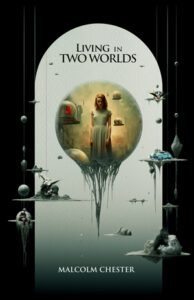“Live your life with purpose and meaning and celebrate your achievements today. This is just the first step in our journey and with a clear purpose, you’ll achieve many more milestones.”
In the realm of contemporary fiction, few books dare to traverse the boundary between the physical world and the spiritual realm as boldly as Malcolm Chester’s “Living in Two Worlds”. This novel is not just a story; it’s a journey into a reality that exists parallel to our own, a world that is just as real and vivid, yet remains unseen.
The book opens with Karen, our protagonist, who is abruptly thrown into a world where spirits are not just myths but a part of everyday existence. Karen’s initial skepticism and subsequent acceptance of this new reality are portrayed with a finesse that speaks volumes about the author’s understanding of human nature and its resistance to the unknown.
One of the book’s most remarkable aspects is its world-building. The author creates a spiritual realm that is intricate, governed by its own set of rules and customs. This world is not just a backdrop for the story but an integral part that complements and interacts with the physical world in meaningful ways.
The descriptions of this realm are vivid, imbued with sensory details that make it palpable. The reader can almost see the shimmering aura of spirits and feel the ethereal chill of their presence. The author’s ability to paint this world with words is nothing short of artistic.
The plot of “Living in Two Worlds” is engaging, with enough twists to keep the reader turning pages. The exploration of themes like life, death, and what lies beyond is done with a sensitivity and depth that is both thought-provoking and emotionally resonant.
That said, the pacing does waver in parts. The middle sections of the book, particularly, could be tightened to maintain the momentum established in the early chapters. Additionally, some conflicts seem to resolve too quickly, leaving a desire for a more drawn-out, satisfying conclusion.
In conclusion, “Living in Two Worlds” is a memorable foray into a realm that blends the real with the surreal. It challenges the reader’s perceptions of reality, urging them to consider the existence of worlds beyond their own. Despite some pacing issues and underdeveloped secondary characters, the book is a testament to the author’s imagination and storytelling prowess.
It’s a novel that stays with you long after the last page is turned, a journey into the unknown that feels surprisingly familiar. “Living in Two Worlds” is not just a book; it’s an experience, one that is as enlightening as it is entertaining.
—R. Friedland.

